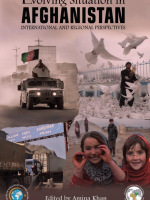The Afghan Taliban and Transnational Jihadism
Almost twenty years after the toppling of their first government in Afghanistan, the Taliban re-emerged as the governing power in Kabul in August 2021. Their return to power sparked a number of debates, both among scholars of jihadism and the wider public. In particular, how would the Taliban’s return to power impact its relationships with the outside world?
The new book “Evolving Situation in Afghanistan: International and Regional Perspectives”, edited by Amina Khan and published by the Centre for Afghanistan, Middle East and Africa (CAMEA) at the Institute of Strategic Studies Islamabad (ISSI) provides a variety of regional perspectives on these questions.
DIIS Senior Researcher Mona Kanwal Sheikh and Research Assistant Dino Krause have contributed to this book through a chapter that analyses the repercussions of the Taliban’s return to power for the group’s relations with the wider jihadi movement. Arguing that neither the Taliban, nor al-Qaeda or the Islamic State constitute uniform, unambiguous or undynamic movements, the authors draw out some general observations in regard to how the Taliban’s return to power may affect their relationships with these organizations.
Despite the fact that the recent killing of al-Qaeda-leader Ayman al-Zawahiri in Kabul, under the eyes of the new Taliban administration, signalled the continued links between the two entities, Sheikh and Krause mention some factors that should motivate the Taliban to limit the growth of al-Qaeda within Afghanistan. The authors highlight the Taliban’s need for external financial and development support, but also a series of measures taken by the group against Salafi mosques across the country, arguing that this might constitute a challenge to their bonds with al-Qaeda, as the latter is ideologically closer to the ahl-e-Hadith-inspired Salafi movement in Afghanistan.
As regards Islamic State’s Khorasan Province (ISKP), it is carved out that the group in fact managed to increase its attacks in Afghanistan after the Taliban takeover, suggesting that it is likely to continue challenging the Taliban militarily in the future.
Last, Sheikh and Krause discuss the relationship between the Afghan Taliban and their sister organization in Pakistan (Tehrik-e Taliban Pakistan). While, on one hand, the Taliban takeover in Afghanistan offers room for extended cooperation, the authors also point towards similarities in the sectarian views of ISKP and the Pakistani Taliban, which may undermine future collaboration between the two Taliban movements.
DIIS Experts




